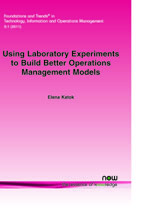Using Laboratory Experiments to Build Better Operations Management Models
By Elena Katok, The Pennsylvania State University, Smeal College of Business, USA, ekatok@psu.edu
Abstract
Laboratory experiments give researchers a great deal of control, making them useful for testing analytical models. In this monograph I discuss methodological issues in designing and conducting laboratory experiments. I also summarize some of the recent advances in using laboratory experiments in Operations Management.
Using Laboratory Experiments to Build Better Operations Management Models
Using Laboratory Experiments to Build Better Operations Management Models focuses on controlled laboratory experiments used to test existing, and develop new, theory in operations management. Much of the methodology I discuss is in line with economics rather than psychology, which also provide a valid and useful, but different, paradigm. This monograph is organized as follows. Section 2 presents a short history of experimental economics, focusing specifically on some fundamental games that proved to be important in economics as well as in behavioral operations management. Section 3 discusses some basics of experimental design as well as "best practices" for conducting laboratory experiments. This section reviews issues related to providing a context, the effect of subject pool, the effect of incentives, and the uses of deception. The goal of sections 4, 5, and 6 to is outline how experiments have been used to shed light on behavioral factors within three different operational contexts – the behavior in the Newsvendor problem (section 4), supply chain contracts (section 5), and procurement auctions (section 6). Section 7 concludes with a discussion of future trends and promising directions for future research.
